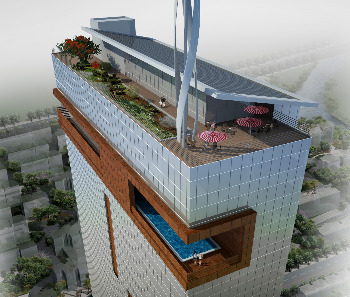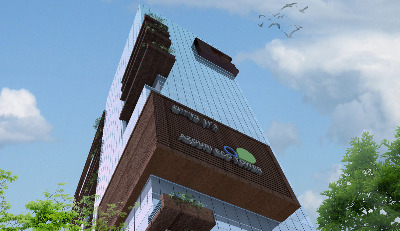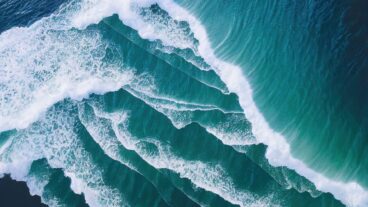
Israel’s scarce water and energy resources were foremost in the minds of constructors Ronen and Alon Azouri when they designed Tel Aviv’s first ‘green’ office tower. Using recycled sustainable and/or domestic building materials and ecological maintenance procedures, their goal was to create an office block with a long-term low impact on nature.
Now, as it nears the end of its first phase of construction, the $51.8 million project looks set to achieve that goal. The building, by Azouri Brothers Building and Development, will be the second green edifice in Israel after Intel’s latest Development Design Center in Haifa.
Forty-one-year-old Ronen Azouri says his enthusiasm for the forward-thinking project has been simmering for many years. “I’ve been reading Popular Science since I was 11,” he says with a laugh. When the project was given municipal and district planning approval in July, he realized he was on his way to fulfilling his dream. “I knew at that stage my dream could come true, with all the issues we want to integrate. Now I want to make it real,” he says.
Water efficiency is a key element of his dream. The eco-tower will feature clearly marked purple tubing carrying recycled, filtrated water to the toilets and to two garden areas, saving up to 13,000 liters a day. “It’s ridiculous to use drinking water for these things,” Azouri tells ISRAEL21c.
Adding other water-saving measures such as infrared restroom taps and humidity control, Azouri estimates that per day, the 20-storey tower will consume at least 16,000 liters of water less than a conventional office building. “Our engineer’s report says 18,000, but I’m being conservative,” he volunteers. “Even at 16,000, if you multiply that by 300 days it will mean saving more than four million liters a year.”
Minimizing energy expenditure
Using insulated double silver sn62glass, which allows up to 62 percent natural light while keeping out at least 25% of the sun’s heat, will minimize energy expenditure. This Israeli-made material is forged partially of recycled glass.
Solar panels will be positioned on the roof to provide electricity – a $530,000 investment that should pay for itself within two years – and the possibility of wind turbines is being considered. A small solar water heater will provide hot water for two showers intended to encourage bicycle commuting.
With the help of Israeli architect Keren Yedvub and British green building consultant Guy Battle, the Azouri brothers designed their project with a continuous filtered fresh air system and online monitored climate control; a condensed recycled cardboard material from Germany for exterior coatings; and parquet floors of certified wood from sustainable forests.

Ronen Azouri is writing a protocol for maintenance to facilitate compliance with his green goals. “Most of the garbage will be recycled; we are placing proper bins to separate cardboard, paper, and glass where they can be easily discarded and picked up. I want everyone here to participate and be proud as they follow the protocol, because a winning concept has to involve people in the right way. The idea is that the project is alive,” he says.
Azouri personally fields proposals from Israeli firms offering tens of thousands of products that could potentially be used in the edifice.
Expecting to achieve silver or gold
“Artists, botanists, other advisers and inventors offer ideas, and I am happy to see whether I can give them a stage to do their thing and integrate something positive,” he relates. “We will constantly reevaluate each new material and maximize it, and I will manage the building for at least the first two years to see that ‘my baby’ is growing properly.”
The official opening is scheduled for March, but by January the brothers expect their first tenants, including a technical college and a Mercedes auto showroom, to move in. The first seven floors are already sold out, indicating a buzz about the project that may support studies cited by Battle showing that workers in ecologically sound buildings are more efficient and productive.
The project is significantly located on the largely undeveloped Hamasger Street, which is to be at the heart of Tel Aviv’s light rail route expected to begin functioning in five years. One of the few structures on the street is a commercial center built by the Azouri brothers’ father, Menashe, in 1990. The sons moved their headquarters into it three years ago, after their father died. “We knew the most important project would be here,” says Ronen.
While eco-architect Elias Messinas, who works in Israel, Greece and Cyprus specializes in ecological building and passive solar architecture and a number of local universities have received ‘Green Campus’ labels from the Ministry of Environmental Protection, green building in Israel is still in relatively fledgling stages, reflecting building codes that are not yet as environmentally advanced as those in England or the United States.
However, Battle says he expects the Azouri eco-tower to achieve a silver or gold level equivalent in the Leadership in Energy and Environmental Design (LEED) rating system, a certification program of the US Green Building Council. The Israel Green Building Council is hoping to implement a LEED system for Israel within two years.













